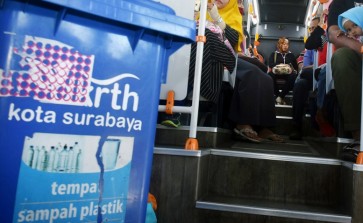Popular Reads
Top Results
Can't find what you're looking for?
View all search resultsPopular Reads
Top Results
Can't find what you're looking for?
View all search resultsIndonesia’s smart cities: Investing for the long haul
Delivering public service is indeed one part of smart city development, yet there is a broader part of development that needs more focus, especially from the government. Smart city is essentially the revelation of smarter decision-making based on abundant data by leveraging technology. So, technology is the tool and not the end goal.
Change text size
Gift Premium Articles
to Anyone
 Delivering public service is indeed one part of smart city development, yet there is a broader part of development that needs more focus, especially from the government. Smart city is essentially the revelation of smarter decision-making based on abundant data by leveraging technology. So, technology is the tool and not the end goal. (JP/Aman Rochman)
Delivering public service is indeed one part of smart city development, yet there is a broader part of development that needs more focus, especially from the government. Smart city is essentially the revelation of smarter decision-making based on abundant data by leveraging technology. So, technology is the tool and not the end goal. (JP/Aman Rochman)
“Smart city” is the buzz term for collective digitalized activities by the government, private sector and citizens. But what does “smart city” really mean? The European Union definition for smart city is a place where traditional networks and services are made more efficient with digital and telecommunication technologies for the benefit of its inhabitants and businesses. Some others define the smartness of a city to include sustainable indicators such as carbon dioxide emission. In Indonesia, smart city is more associated with the “electronification” of government services.
The concept has become a shared vision for future cities in advanced and developing countries, requiring the collective effort of all stakeholders in the city. Singapore, Seoul, Kashiwa-no-ha in Japan and Barcelona in Spain are examples of thriving smart cities. Their stakeholders have taken a long time to develop “the smartness” of their cities. Japan has been developing Kashiwa-no-ha for more than a decade. Barcelona’s government had saved public funding for smart city development for more than two decades. And Seoul had initiated the smart city project since 1998. The required time indicates the complexity of smart city development. Technology-savvy human resources are extremely crucial to run a smart city. Therefore, it most likely will require a much longer time for developing nations to develop smart cities successfully.
Such smart cities are nevertheless vital because first, more than half of Indonesia’s population now lives in urban areas, forecast to increase beyond 82 percent in 2045. The unprecedented rate of urbanization amid persistent problems in the cities will only worsen, such as dense slums, traffic gridlock and a steep increase in energy consumption without significant effort to improve energy efficiency.
Efforts to develop smart cities in Indonesia intensified following the issuance of Presidential Decree No. 95/2018 on e-government, after the selection of 100 cities as pilot projects. However, most of the efforts of local governments have been limited to the electronification of public services such as business licensing and driver’s license applications. One example is the SiCantik app from Tomohon city in North Sulawesi, which allows people to apply for local business licenses and make complaints electronically. Cities compete to make apps with the help of external information technology companies, including start-ups. While the main goal of smart cities is effectiveness, this large batch of apps creation with consultants’ help does not imply the more efficient use of resources.
Delivering public service is indeed one part of smart city development, yet there is a broader part of development that needs more focus, especially from the government. Smart city is essentially the revelation of smarter decision-making based on abundant data by leveraging technology. So, technology is the tool and not the end goal.
For example, a city’s public transportation authority can formulate more efficient routes based on analytics derived from people’s movement data generated by data recording infrastructure, such as CCTVs, sensors or electronic ticketing. The data and information should be accessible to all city stakeholders for their decision-making analytics.
The most influential part to make a smart city is to build an enabling environment through information technology (IT) infrastructure and human capital. IT infrastructure, such as internet connection, data recorders and data centers are needed to capture, record and store data for decision-making analytics. Highly skilled human resources are essential to build the system and to do the analytics using cutting edge digital methodology, such as machine learning, artificial intelligence and the internet of things. Infrastructure is much easier to obtain than human capital.

















